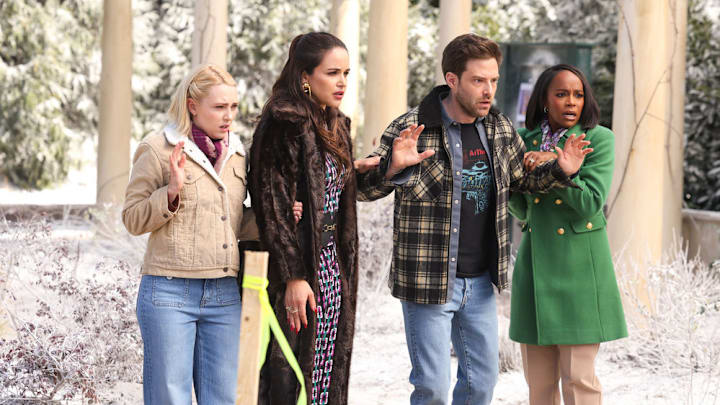Grosse Pointe Garden Society may have potential, but as of the conclusion of season one, it is a fun enough series that does not quite cross the line as the most memorable murder mystery. The NBC drama has a lot going for it, recognizing itself as a suburban light-hearted series, rather than taking itself too seriously as if to be the next How to Get Away with Murder. Grosse Pointe Garden Society lacks a strong central anchor, choosing instead to rely on an interesting and flawed ensemble cast. For as decent as the performances may be, as each actor presents a strong distinction of their character, the storylines themselves do not quite make the splash that the series aims for.
The show takes place in a wealthy small town that lacks the danger or history presented in shows such as Pretty Little Liars or Riverdale, where small towns where nothing ever happens become the center of chaos fairly quickly. In comparison, Grosse Pointe is a mostly calm location surrounding residents who present themselves more perfectly than they actually are and gossip about each other when one falls from their unrealistic pedestal. Grosse Pointe Garden Society focuses on the lives of Birdie, Catherine, Brett, and Alice in the lead-up and aftermath of a mysterious death. However, even as the series gives each of its main characters a decent individual plot, personally and professionally, it just stops short of really stepping up as the next murder mystery hit series.
Where ABC's How to Get Away with Murder thrived under the leadership of Viola Davis' Annalise Keating and Freeform's Pretty Little Liars kept viewers invested in the disappearance of Alison DiLaurentis and the identity of "A," Grosse Pointe Garden Society does not have the same addictive and memorable characters, storylines, or attributes. Although the first season presents some aspects of promise and potential, its tonal choice prevents the series from diving headfirst into a darker mystery drama as it wants to remain in a more light-hearted, flowery approach. While the occasional comical moment or the line of dialogue does land, the split tone of drama and comedy never quite helps the series move forward. Yet, it also does not entirely hold it back either. The choice of allowing the show to come across as being more light-hearted than other murder mysteries allows it to feel slightly more unique among similar concept shows.
The ensemble cast and the relationships between the main characters are where this series shines the brightest. Birdie's desire to get to know the son whom she gave up for adoption adds layers to her character. Catherine's affair and the aftermath present a look at what it means for Catherine and her husband, Tucker, to regain trust and rediscover what their marriage means to them. Brett's striving to co-parent with his ex-wife, Melissa, and ensure that he makes himself available to his kids, while standing up to Melissa's husband, Connor, gives Brett's character more substance than just a man pining for his married best friend. Alice has plenty going on family-wise, as her plot shows the growing distance between her and her husband, Doug, and how it only continues to grow after the death of Alice's dog, as well as how that impacts her relationship with her mother-in-law, Patty.
Alice's relationship with Patty is even more important to the core of the storyline than her relationship with Doug, as Alice and Patty's opposing perspectives, and a tragic misunderstanding about how Alice's dog truly dies, resulted in the unfolding of Patty's husband Keith's death, the event the series surrounds. However, it is the friendship between Catherine, Alice, Birdie, and Brett that really allows the series to breathe. Their relationship with each other helps ground the show and presents the drama's best elements. Each of their individual storylines helps give a background to who they are as people, and in what ways they are flawed, but those plot lines never come at the expense of the main four spending time or working together. The dual timeline format helps to put the pieces together of how they all work together, while also suggesting by the end of the season that, if the show were to continue, their small circle may be expanding, given revelations about the night's events to others.
Grosse Pointe Garden Society is ultimately a fairly ordinary series. Its best attributes offer plenty of potential if the show gets to continue. Sometimes, it takes a second season for a show to really find its voice and discover the best parts of itself. Season one set the foundation for plenty of potential if the show moves forward. However, while there are loose plot threads, if the show were to end with season one, it did answer most of its primary questions, which allows for a sense of closure even if some things were left open-ended.
